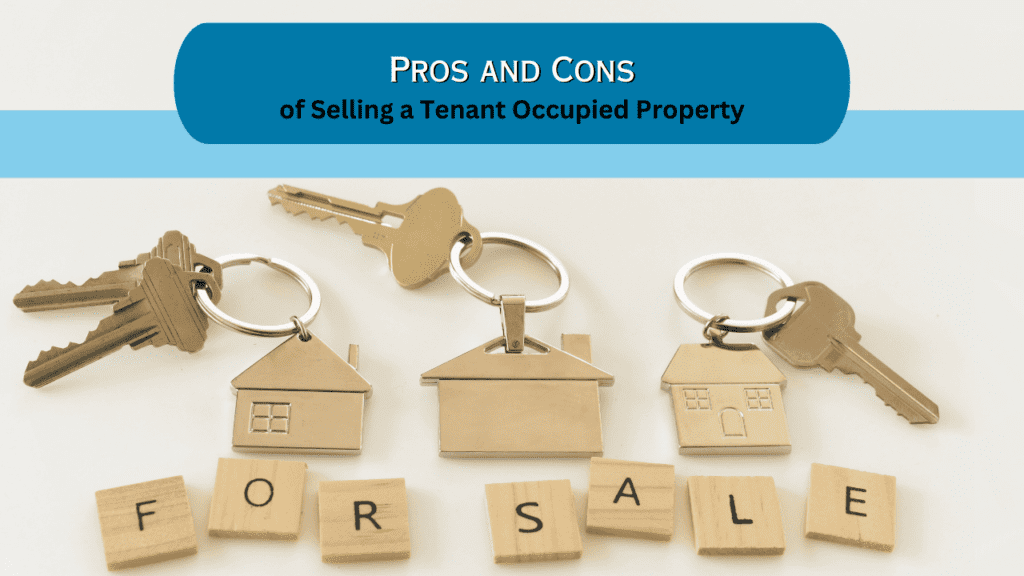
Thinking about selling your investment property, but you’re not sure what to do with your tenants?
If you’re a landlord wanting to sell a home, you might think it’s easier to wait until you have a vacant property. With the rental market as competitive as it is, however, and tenant protections stricter than ever, you really can’t count on having an empty property just because a lease term is ending.
You may have to sell with your tenants in place.
This is not an uncommon strategy, and selling an occupied investment property can be a great way to maximize your profits from the sale, especially if you’re selling to another investor. When you’re marketing your property as an investment with income potential, you’ll attract other real estate investors. They’ll likely be thrilled to already have a tenant in place; they don’t have to do any marketing to find a new tenant. This will speed up the process of the transaction.
However, not all potential buyers will be investors. Marketing your home to a buyer who wants to move right into the home they buy will present new challenges when you’re selling an occupied property.
Before making any decisions about whether or not to sell while your tenants are still in residence, you’ll want to weigh out all of your possible options along with both pros and cons that could arise from such a situation.
Let’s talk about how occupied homes work on the sales market.
Benefits of Selling a Tenant Occupied Rental Property
There are definite advantages to selling a rental property that’s already occupied. Here’s how and why it might work to your advantage, especially in the current San Diego rental market.
- An Occupied Property is Attractive to Investment Buyers
When you put an occupied rental property on the real estate sales market, it can be much more attractive to potential buyers who are hoping to purchase an income producing rental property. Your new buyers already have rental income in place; they don’t have to worry about finding tenants for the property or dealing with vacancy periods that often come with empty properties. This will lead an investor to feel more secure. They’ll be willing to negotiate a more favorable price for the property because they don’t have to budget for the potential vacancy period. They don’t have to spend extra money right out of the gate on marketing and advertising to find that ideal first resident. They’ll also save on the improvements and renovations they might have needed to get the property ready for the rental market.
- You’ll Earn Rent While Selling Your Property
As the seller, you’ll also benefit from selling an occupied property. If you wait until the property is vacant, you won’t have any income to support you or your property during the sales process. However, when you’re listing and showing and selling a home that’s occupied, you’re still collecting rent. This is good news for your continuous cash flow and for your ultimate return on investment (ROI).
When you need this income as you wait for the deal to close, this is a huge benefit. Sometimes, owners will try to sell a home that operates on a thin margin as is, and even a single month of vacancy can cause huge cash flow problems. If you move your tenants out of the property and it does not sell right away, you could find yourself losing a lot of money. Selling with tenants in place allows you to generate rental income during the sale process.
- Vacant Properties Can be Vulnerable
When you’re selling your occupied rental property, you have the benefit of keeping someone in place to ensure the property is safe, attractive, and habitable. A vacancy property is risky; it’s a green light to criminals, vandals, and thieves. During the sales process, you might find that someone has broken into your empty home and stolen appliances or equipment. Keeping your tenants in place during the sales process means you’ll have daily eyes on the home. Your tenants will continue to report maintenance issues. You won’t have to worry about a pipe bursting and flooding the home without anyone noticing.
Anything is possible when a home is empty, and it seems maintenance catastrophes and emergencies occur more often while a home is vacant.
Challenges to Selling a Tenant Occupied Property
As we have discussed, there are plenty of good reasons to sell a property while your tenants are still in place. However, the process can also deliver some additional challenges and disruptions. This is especially true when we’re talking about your occupants. You’ll have to coordinate with them to show the property. Or, you might find that your tenants are a bit grumpy about the sale, and they’re not thrilled with anyone going through the property while they’re not there.
Here are some of the cons to selling your property while it’s occupied.
- Showings Can be Challenging for Buyers
Showing an unoccupied property will always be easier than showing a property that has tenants living there. Potential buyers might worry about disrupting your current tenants when they come through the house. They cannot view the property empty; there will be furniture and personal belongings, and possibly evidence of pets and children. It’s hard not to feel like you’re intruding on someone else’s space when a home is occupied.
- Showings Can be Challenging for Tenants
Ideally, your tenants will be willing to leave the property when potential buyers come to look at it. This isn’t necessarily easy for you to coordinate. If you have a great relationship in place with your tenants, there are likely no worries. They’ll be interested in helping you. If your relationship is combative or unpleasant, however, you may find your tenants are not willing to cooperate. They may even work against you.
Coordinate as best you can. Be sensitive to the schedule your tenant keeps.
- Cleanliness and Tenant Standards
Another common problem when you’re selling an occupied property is that you cannot control how clean and tidy the property is. If you have tenants living in an unkempt home, showings will be awkward. You’ll also turn off potential investor buyers, because they’ll get an immediate look at what type of tenant they’re inheriting. Even if they’re still willing to buy, showing a messy or dirty property provides many investors with an upper hand; they’ll likely offer an extremely low price for your property.
Sellers typically want the broadest possible pool of buyers for their properties. However, selling a renter-occupied property narrows the field of potential buyers to mostly investors.
- Staging is Impossible
You won’t be able to stage a home that’s occupied, nor will you have an easy time making the upgrades and updates that you might have made before listing a vacant home on the market. When your tenants are still living in the home, you’ll have to work around them to have any renovations made on the property. You may want to repaint the property before you sell it, and if you do, there will be some extra time and effort needed. This could add extra costs to the preparations you’re making for the sale.
Hopefully, your home is already in good condition. That will make those minor repairs fairly easy during the tenancy. Major projects, however, may be more difficult to navigate.
- Your Pool of Buyers Shrinks
You can sell an empty home to any buyer; investors or owner-occupants. When you sell an occupied property, however, your buyers know that they cannot move in themselves. At least not right away. You are eliminating an entire class of first-time buyers. Anyone who wants to move into a home quickly after they purchase it will have to avoid your listing.
In some situations, a buyer can wait out the end of your tenant’s lease agreement. However, your pool of potential buyers will definitely shrink a bit when the home you’re selling has someone living in it.
Sell Now, or Wait?
 Coordinating the sale of your home around the end of a lease is sometimes the best option. However, if you decide against that, and move forward with selling your property even while a tenant is living there, you can still be successful. You will, however, need to plan for the potential downsides of this decision.
Coordinating the sale of your home around the end of a lease is sometimes the best option. However, if you decide against that, and move forward with selling your property even while a tenant is living there, you can still be successful. You will, however, need to plan for the potential downsides of this decision.
Working with a great property management team can help. Your property manager can be a conduit between you, your real estate agent, your tenants, and any vendors or contractors who may need to get inside the home. Having that expert advice and access to all those resources will make a challenging process a little more manageable.
We have worked with all sorts of real estate investors, and we have helped navigate every potential situation. If you’re not sure how to make this decision or what you can do to make it work out for the best, contact us at Chase Pacific Property Management & Real Estate Services. We can come up with a plan.
